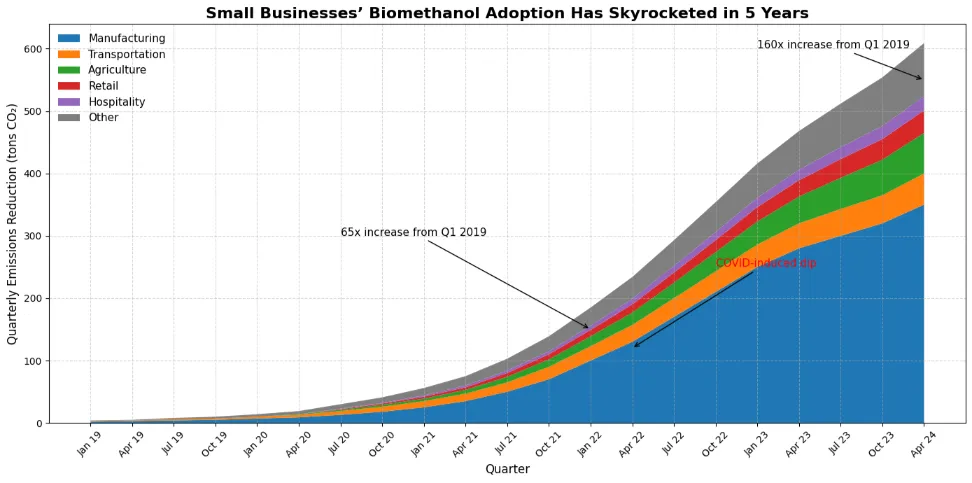The Biomethanol Advantage
How Small Businesses Are Cutting Emissions While Boosting Their Bottom Line
The Biomethanol Advantage: How Small Businesses Are Cutting Emissions While Boosting Their Bottom Line
Introduction: A New Era for Small Businesses
In today’s fast-changing business world, small businesses face a tough challenge. They need to stay profitable while also meeting increasing demands for sustainability. As climate regulations tighten and consumers focus more on eco-friendly brands, small enterprises must find solutions that offer both environmental and financial benefits. Biomethanol is stepping in as a renewable, low-carbon fuel that is quietly changing how small businesses operate.
Large corporations may have the resources to invest in high-profile green projects, but small businesses often have tighter budgets. Biomethanol is altering this landscape by providing a simple and scalable way for small companies to lower emissions and improve profits. This guide will delve into what biomethanol is, why it’s crucial for small businesses, and how it helps companies in various sectors thrive in a greener economy.
What Is Biomethanol?
Biomethanol is a sustainable alternative to traditional methanol. It is made from renewable resources like agricultural waste, forestry residues, municipal solid waste, or captured carbon dioxide. Unlike regular methanol, which comes from fossil fuels, biomethanol significantly reduces greenhouse gas emissions. It supports circular economy principles.
How Is Biomethanol Made?
Biomethanol can be produced through several methods:
- Gasification of Biomass: Organic waste is turned into synthesis gas (syngas), which is then converted into methanol.
- Anaerobic Digestion: Microorganisms break down organic material to produce biogas, which can be transformed into methanol.
- Power-to-Methanol: Renewable electricity splits water into hydrogen, which combines with captured CO₂ to create methanol.
Each method takes waste or renewable resources and turns them into a high-value, low-carbon fuel, making biomethanol appealing both environmentally and economically.
The Biomethanol Advantage for Small Businesses
1. Significant Emissions Reduction
For small businesses looking to reduce their carbon footprint, biomethanol is a powerful option. When made from waste or renewable sources, biomethanol can cut lifecycle CO₂ emissions by up to 80% compared to fossil-based methanol. This makes it a suitable choice for businesses aiming to meet regulations or voluntary sustainability goals.
2. Cost Savings and Operational Efficiency
Switching to biomethanol can save significant costs. Here’s how:
- Lower Fuel Costs: As production increases and technology improves, biomethanol is becoming more cost-competitive with fossil fuels.
- Reduced Waste Disposal Fees: Businesses that produce organic waste can partner with biomethanol producers, turning a waste disposal cost into a source of revenue.
- Energy Efficiency: Biomethanol’s high energy density and compatibility with existing infrastructure lessen the need for expensive equipment upgrades.
3. Brand Value and Customer Loyalty
Consumers tend to favor businesses committed to sustainability. By adopting biomethanol, small businesses can:
- Boost Their Green Credentials: Share their emissions reductions and renewable fuel use.
- Attract Eco-Conscious Customers: Stand out in a crowded marketplace.
- Meet Supply Chain Requirements: Many large firms now require suppliers to disclose and lower their carbon footprints.
4. Regulatory Compliance and Incentives
Governments around the world are implementing stricter emissions standards and providing incentives for renewable fuel use. Small businesses that switch to biomethanol can benefit from:
- Tax Credits and Grants: Financial support for investing in clean technologies.
- Avoiding Penalties: Stay compliant with regulations and avoid fines.
- Access to New Markets: Meet sustainability criteria needed by certain buyers or regions.
Real-World Impact: Biomethanol in Action
Let’s look at some examples of small businesses using biomethanol to cut emissions and increase profitability.
A. Manufacturing
Case Study: GreenTech Plastics
GreenTech Plastics, a small producer of packaging materials, switched from fossil-based methanol to biomethanol for its manufacturing process. The outcomes?
- Emissions Cut by 75%: The company’s annual carbon footprint dropped significantly.
- Cost Savings: Lower fuel expenses and a new partnership with a local waste management firm reduced operational costs.
- New Customers: GreenTech landed contracts with eco-conscious brands seeking sustainable packaging options.
B. Transportation and Logistics
Case Study: EcoMove Couriers
EcoMove Couriers, a regional delivery service, modified its fleet to run on biomethanol-blended fuel. Benefits included:
- Lower Fuel Bills: Biomethanol’s stable pricing shielded the company from oil price swings.
- Regulatory Compliance: The fleet met new city emissions standards, avoiding costly fines.
- Marketing Edge: The “green fleet” campaign attracted new business clients.
C. Agriculture
Case Study: FreshFields Farms
FreshFields Farms, a family-owned produce supplier, teamed up with a local biomethanol producer to convert crop waste into fuel for its delivery vehicles and generators.
- Waste-to-Fuel: The farm turned crop residues into a valuable resource instead of paying for waste removal.
- Energy Independence: On-site biomethanol production decreased reliance on outside fuel providers.
- Community Leadership: The farm set an example for sustainable agriculture in the area.
D. Retail and Hospitality
Case Study: The Green Table Café
The Green Table Café, an urban restaurant, began using biomethanol for cooking and heating.
- Cleaner Air: Lower indoor and outdoor air pollution improved the dining atmosphere.
- Cost Control: Stable energy costs helped the café manage economic uncertainty.
- Positive Publicity: Coverage from local media increased foot traffic and sales.
The Market Momentum: Biomethanol’s Rapid Growth
The biomethanol market is expanding rapidly, driven by demand from both large and small businesses. According to industry analysts, global biomethanol production is expected to grow from $254.6 billion in 2025 to $631 billion by 2035, reflecting a compound annual growth rate (CAGR) of 9.5%.
Why the Surge?
- Policy Support: Governments are requiring renewable fuel usage and offering incentives.
- Technological Advances: Improved production methods are decreasing costs and increasing supply.
- Corporate Commitments: Many companies are setting ambitious emissions reduction goals.
Visualizing the Growth
The rise of biomethanol adoption among small businesses resembles the trajectory of China’s EV exports. The market has experienced a rapid increase in adoption over the past three years due to key drivers like:
- COVID-19 Recovery: As economies improved, businesses sought resilient, sustainable energy sources.
- Supply Chain Pressures: Disruptions highlighted the need for local, renewable fuels.
- Consumer Demand: Shoppers increasingly prefer brands with verifiable green practices.
Overcoming Barriers: How Small Businesses Can Get Started
While the benefits of biomethanol are clear, small businesses might face challenges in making the switch. Here’s how to address those hurdles:
1. Access to Supply
- Partner with Local Producers: Many areas now have biomethanol facilities ready to work with small businesses.
- Join Buying Groups: Collaborating with other businesses can lead to better prices and reliable supplies.
2. Technical Know-How
- Consult Industry Experts: Organizations like the Methanol Institute provide resources and guidance.
- Leverage Government Programs: Many governments offer technical help for renewable fuel adoption.
3. Financing the Transition
- Tap into Grants and Incentives: Look for funding opportunities at local, state, and national levels.
- Explore Green Loans: Many banks offer favorable terms for sustainability investments.
4. Staff Training and Engagement
- Educate Employees: Training on new processes helps ensure smooth implementation and maximizes benefits.
- Promote a Green Culture: Involve staff in sustainability projects to boost morale and innovation.
The Bottom Line: Biomethanol as a Profit Driver
For small businesses, switching to green practices is no longer just about compliance or corporate responsibility; it’s also about gaining a competitive edge. Biomethanol provides an excellent mix of environmental benefits and economic gains.
Key Financial Benefits
- Lower Operating Costs: Reduced fuel and waste disposal expenses.
- New Revenue Streams: Selling waste for biomethanol production or marketing green products.
- Improved Risk Management: Protection from fossil fuel price swings and regulatory changes.
Measurable Impact
- Emissions Reduction: Track and report carbon savings to customers and regulators.
- Brand Growth: Highlight sustainability achievements in marketing and public relations efforts.
- Customer Retention: Build loyalty among eco-conscious consumers.
Future Outlook: Biomethanol and the Small Business Revolution
As the world moves toward net zero, small businesses will play a vital role in driving the green transition. Biomethanol is well-positioned to empower these businesses by offering a practical solution for cutting emissions and increasing profits.
Emerging Trends
- Integration with Other Renewables: Biomethanol can work alongside solar, wind, and biogas in hybrid energy setups.
- Growth in New Sectors: From construction to healthcare, more industries are recognizing biomethanol’s potential.
- Digital Tools and Tracking: New platforms simplify monitoring and reporting sustainability progress for small businesses.
Conclusion: Seize the Biomethanol Advantage
The message is clear: biomethanol isn’t just for large companies. Small businesses worldwide are using its benefits to lower emissions, save money, and build stronger brands. With supportive policies, improving technology, and rising consumer demand, now is an ideal time to make the shift.
Ready to Explore Biomethanol for Your Business?
Get our free guide on implementing sustainable fuel solutions for small businesses.
Download Now
🌿 Biomethanol Resource Opportunities
1. Industry Publications
- Biofuels Digest – Share news about small business adoption.
- Renewable Energy World – Submit editorials or insights on developments.
- GreenBiz – Cover sustainability initiatives in business.
2. Business & Sustainability Platforms
- Small Business Trends – Explore practical use cases and trends.
- Sustainable Brands – Join community discussions and case studies.
- Eco-Business – Submit opinions or news on emerging tech.
3. Community Forums
- Quora – Participate in conversations on fuels and sustainability.
- Reddit r/smallbusiness and r/renewableenergy – Engage in topic-specific threads.
4. Directories & Industry Groups
- Methanol Institute – Connect with organizations in the sector.
- Bioenergy Insight Magazine – Share developments and news content.
5. Content Platforms
6. News Distribution
- PR Newswire – Share updates or original analysis.
- Business Wire – Reach wider audiences with important findings.
7. Group Discussions & Forums
- Energy Central – Start discussions within professional groups.
- CleanTechnica – Join active comment sections or forums.
- Craft tailored messages when reaching out to editors or moderators.
- Highlight unique insights or original data.
- Contribute across different formats—articles, answers, discussions.

